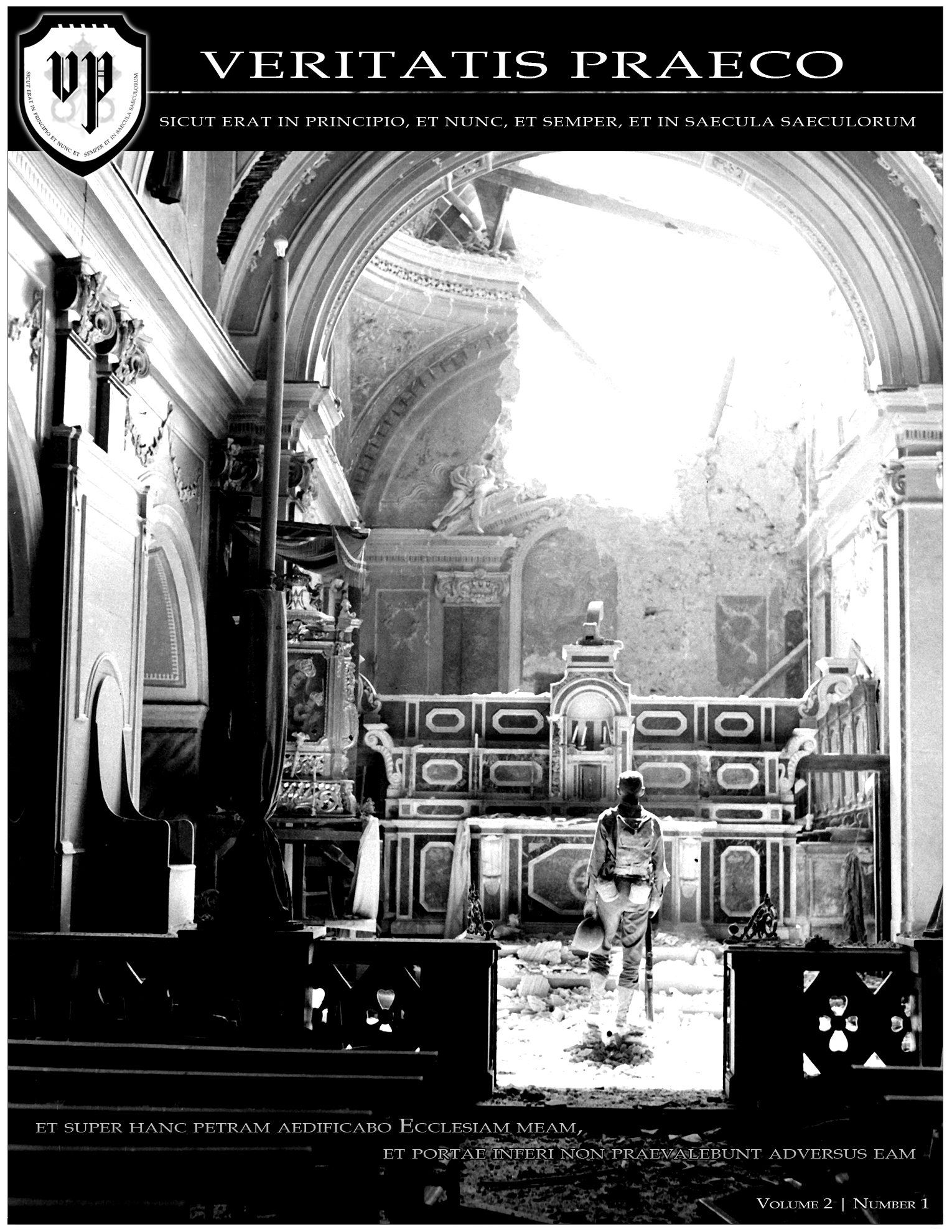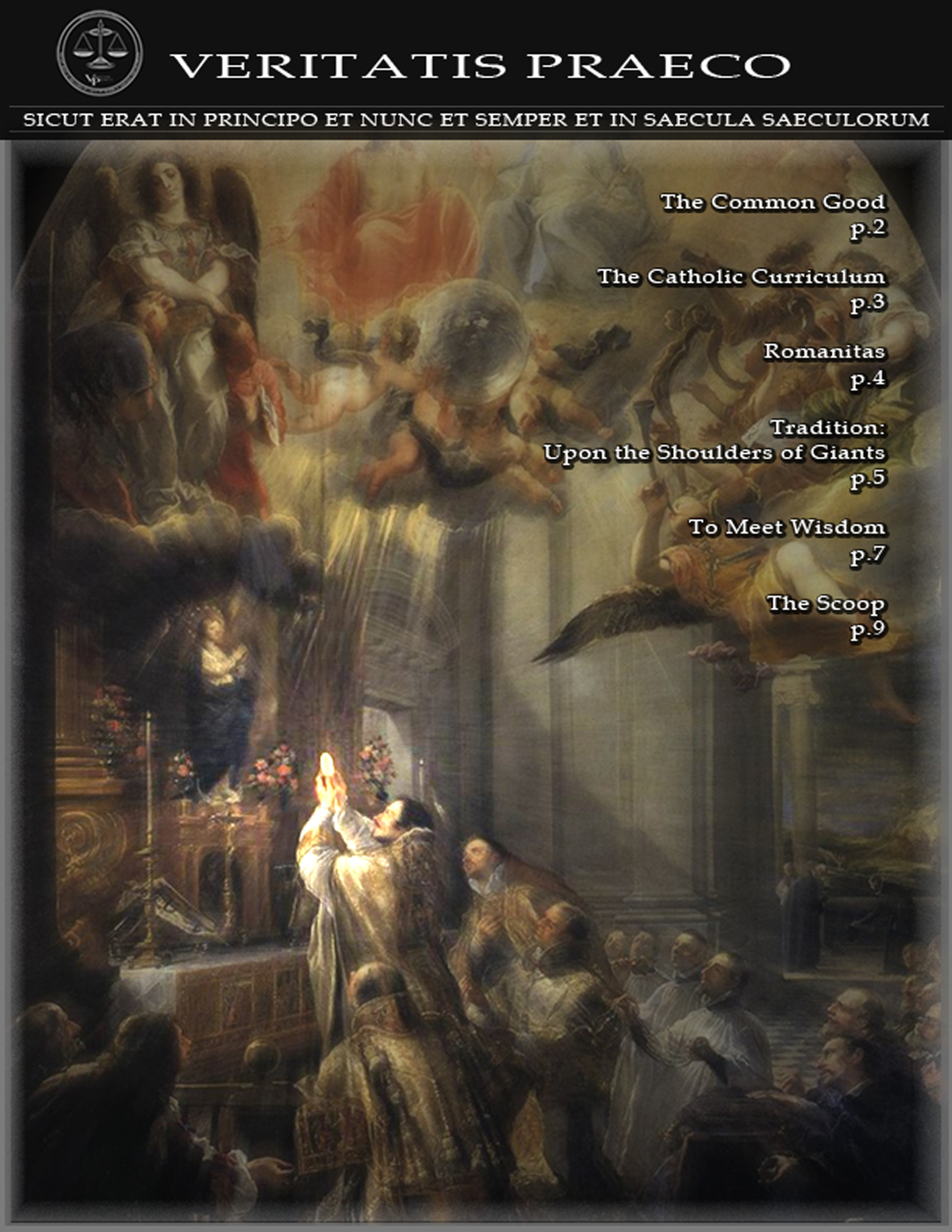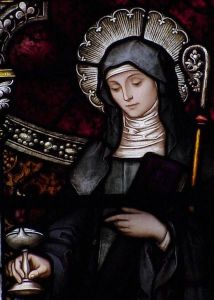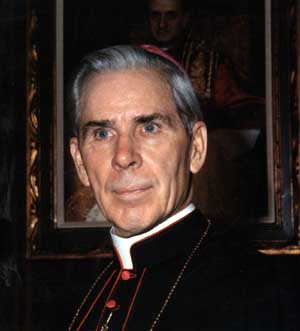Archive
Logos [7-1-2010]
Liberty, nature’s most exalted gift, the endowment of intellectual and rational beings only, confers on man the dignity of abiding “in the hand of his counsel,” of having power over his own actions. But the manner in which this dignity is exercised is of the greatest moment, inasmuch as on the use made of liberty the highest good and the greatest evil alike depend. Man, indeed, is free to obey his reason, to seek moral good, and to strive unswervingly after his last end. Yet he is free also to turn aside to all other things, and, in pursuing the empty semblance of good, to disturb rightful order and to fall headlong into the destruction which he has voluntarily chosen.
The Redeemer of mankind, Jesus Christ, after restoring and exalting the original dignity of nature, vouchsafed special assistance to the will of man. By the gifts of His grace here, and the promise of heavenly bliss hereafter, He raised it to a nobler state. In like manner this great gift of nature has ever been, and always will be, deservingly cherished by the Catholic Church; for to her alone has been committed the charge of handing down to all ages the benefits purchased for us by Jesus Christ. Yet there are many who imagine that the Church is hostile to human liberty. With a false and absurd notion as to what liberty is, they either pervert the very idea of freedom, or they extend it at their pleasure to many things in respect of which man cannot rightly be regarded as free.
On other occasions, and especially in Our Encyclical Letter Immortale Dei, while treating of the so-called modern liberties, we distinguished between their good and evil elements. We have shown that whatsoever is good in those liberties is as ancient as truth itself, and that the Church has always most willingly approved and practised that good. But whatsoever has been added as new is, to tell the plain truth, of a vitiated nature, the fruit of the disorders of the age and of an insatiate longing after novelties. Seeing, however, that many cling so obstinately to their own opinion in this matter as to imagine these modern liberties, cankered as they are, to be the greatest glory of our age and the very basis of civil life, without which no perfect government can be conceived, We feel it a pressing duty, for the sake of the common good, to treat separately of this subject.
It is with moral liberty, whether in individuals or in communities that We proceed at once to deal. But, first of all, it will be well to speak briefly of natural liberty: for, though distinct and separate from moral liberty, natural freedom is the fountain-head from which liberty of whatsoever kind flows, by its own force and of its own accord. The unanimous consent and judgement of men, which is the trusty voice of nature, recognizes this natural liberty in those only who are endowed with intelligence or reason; and by his use of this, man is rightly regarded as responsible for his actions. For, while other animate creatures follow their senses, seeking good and avoiding evil only by instinct, man has his reason to guide him in each and every act of his life. Reason sees that whatever things are held to be good upon earth, may exist or may not. Discerning that none of them are of necessity for us, it leaves the will free to choose what it pleases. But man can judge of this contingency, as we say, only because he has a soul that is simple, spiritual, and intellectual–a soul, therefore, which is not produced by matter, and does not depend on matter for its existence; but which is created immediately by God. Far surpassing the condition of things material, it has a life and action of its own, so that, knowing the unchangeable and necessary reasons of what is true and good, it sees that no particular kind of good is necessary to us. When, therefore, it is established that man’s soul is immortal and endowed with reason and not bound up with things material, the foundation of natural liberty is at once most firmly laid.
[From Libertas Humana promulgated 20 June 1888 by His Holiness Pope Leo XIII]
*As an aside, the final paragraph could be interpreted in a way that seems out of keeping with the Thomistic-Aristotelian tradition. Consequently, as a caveat, it should be kept in mind that particular material things are unnecessary, but, barring Divine Intervention of an incomprehensible sort, material reality itself is necessary for man–hence man being created as a being that is unified in body and spirit, their division being an unnatural consequence of original sin.
Logos [6-30-2010]
Heresies have often arisen and still arise because of this, that disgruntled minds will quarrel, or disloyal trouble-makers will not keep the unity. But these things the Lord allows and endures, leaving man’s freedom unimpaired, so that when our minds and hearts are tested by the touchstone of truth, the unswerving faith of those who are approved may appear in the clearest light. This is foretold by the Holy Spirit through the Apostle when he says: There must also be heresies, that those approved may be manifest among you. Thus are the faithful proved, thus the faithless discovered; thus too even before the day of judgment, already here below, the souls of the just and unjust are distinguished, and the wheat is separated from the chaff. This explains why certain people, backed by their hot-headed associates, seize authority for themselves without any divine sanction, making themselves into prelates regardless of the rules of appointment, and, having no one to confer the episcopate upon them, assume the title of Bishop on their own authority. In the Psalms the Holy Spirit describes these men as sitting in the chair of pestilence; they are pests and plagues to the faith, snake-tongued deceivers, skilled corruptors of the truth, spewing deadly venom from their poisonous fangs; whose speech spreads like a canker; whose preaching injects a fatal virus in the hearts and breasts of all.
[From The Unity of the Catholic Church by St. Cyprian]
Logos [6-28-2010]
God is not only his essence, as shown above, but also his existence. This can be shown in many ways. First, whatever is in something that is other than its essence must be caused either by the principles of the essences, as in the case of proper accidents following from the species (as the ability to laugh follows from being human and is caused by the essential principles of the species); or by something external (as heat is caused in water by fire). Accordingly, if the very existence of a thing were other than tis essence, then it would be necessary for its existence to be caused either by something external or by its own essential principles. But it is impossible for existence to be caused solely by the essential principles of a thing, because no thing suffices as the cause of its own being if its existence is caused. It therefore follows that anything whose existence is other than its essence must be caused to exist by something else. This cannot be said of God, however, since we call God the first efficient cause. It is therefore impossible in God that existence be other than essence.
Second, existence is what makes every form or nature actual, for neither goodness nor humanity is signified in actuality except inasmuch as we signify that it exists. Accordingly, it follows that existence itself is related to an essence that is distinct from it as actuality is related to potentiality. So since there is no potentiality in God, as shown above, it follows that in God essence is not other than existence. Thus God’s essence is God’s existence.
Third, just as that which has fire but is not itself fire is on fire through participation, so too that which has existence but is not itself existence is a being through participation. But God is his essence, as shown above. Thus if God were not identical with his existence, God would be a being through participation rather than essentially. This would mean that God is not the first being, which is absurd to say. Accordingly God is his existence and not only his essence.
[From Summa Theologiae, Question III, Article 4, in The Treatise on the Divine Nature, by St. Thomas Aquinas]
Logos [6-27-2010]
To know what that was upon which the Crusading host came when they at last saw Antioch, a man must himself have seen the strange small relic of what Antioch once was, standing now today upon its river bank: that little shrivelled present town, the huge precipitous mountainside towering above it, miles and miles of fortified wall with curtain and tower climbing up and down the mountain slopes, crossing the profound gorge and encircling like a vast arm all that now wasteland whereon the mighty city once stood.
It is more than a mile from the banks of the Orontes southward and upward to the crest which the topmost of the wall still follows; it is two miles at least from the western extremity of those defenses downstream, to the eastern extremity, along the Aleppo road. All that great space had been filled for a thousand years with clamor and life. Antioch had been the third city of the Eastern world; it had been crowded with every kind of movement, officialdom, and wealth, a mass of temples and palaces, with colonnades that stretch from end to end. Today it is something larger than a village but not much larger, with not one stone of its antique grandeur remaining to stand against the sky as such things stand in profusion throughout the ruins of antiquity elsewhere, from Mesopotamia to the Channel, from the Sahara to the Rhine.
Of that ancient splendor, how much remained for the Crusaders to see? How much could the Crusading myriads see as their still prodigious column wound down the road from the Orontes crossing towards the walls, with the wide, very large shallow lake upon their right and the dark mountain with its line of towers frowning above them, much as Cader Idris frowns over its abrupt southern steep. What they saw as they approached was certainly something very much more than remains for us today after so many centuries of Mongol barbarism and general Mohammedan neglect.
[From The Crusades by Hilaire Belloc]
Logos [6-17-2010]
[I]f a despotism should be established among the democratic nations of our day, it would probably have a different character. It would be more widespread and milder; it would degrade men rather than torment them.
Doubtless, in such an age of education and equality as our own, rules could more easily bring all public powers into their own hands alone, and they could impinge deeper and more habitually into the sphere of private interests than was ever possible in antiquity. But that same equality which makes despotism easy tempers it. We have seen how, as men become more alike and more nearly equal, public mores becomes more humane and gentle. When there is no citizen with great power or wealth, tyranny in some degree lacks both target and stage. When all fortunes are middling, passions are naturally restrained, imagination limited, and pleasures simple. Such universal moderation tempers the sovereign’s own spirit and keeps within certain limits the disorderly urges of desire.
Apart from these reasons, based on the nature of the state of society itself, I could adduce many others which would take me outside the range of my subject, but I prefer to remain within these self-imposed limits.
Democratic governments might become violent and cruel at times of great excitement and danger, but such crises will be rare and brief.
Taking into consideration the trivial nature of men’s passions now, the softness of their mores, the extent of their education, the purity of their religion, their steady habits of patient work, and the restraint which they all show in the indulgence of both their vices and their virtues, I do not expect their leaders to be tyrants, but rather schoolmasters.
Thus I think that the type of oppression which threatens democracies is different from anything there has ever been in the world before. Our contemporaries will find no prototype of it in their memories. I have myself vainly searched for a word which will exactly express the whole of the conception I have formed. Such old words as “despotism” and “tyranny” do not fit. The thing is new, and as I cannot find a word for it, I must try to define it.
I am trying to imagine under what novel features despotism may appear in the world. In the first place, I see an innumerable multitude of men, alike and equal, constantly circling around in pursuit of the petty and banal pleasures with which they glut their souls. Each one of them, withdrawn into himself, is almost unaware of the fate of the rest. Mankind, for him, consists in his children and his personal friends. As for the rest of his fellow citizens, they are near enough, but he does not notice them. He touches them but feels nothing. He exists in and for himself, and though he still may have a family, one can at least say that he has not got a fatherland.
Over this kind of men stands an immense, protective power which is alone responsible for securing their enjoyment and watching over their fate. That power is absolute, thoughtful of detail, orderly, provident, and gentle. It would resemble parental authority if, father-like, it tried to prepare its charges for a man’s life, but on the contrary, it only tries to keep them in perpetual childhood. It likes to see the citizens enjoy themselves, provided that they think of nothing but enjoyment. It gladly works for their happiness but wants to be the sole agent and judge of it. It provides for their security, foresees and supplies their necessities, facilitates their pleasures, manages their principal concerns, directs their industry, makes rules for their testaments, and divides their inheritances. Why should it not entirely relieve them from the trouble of thinking and all the cares of living?
[From Democracy in America by Alexis De Tocqueville, written in the first half of the 19th century]








